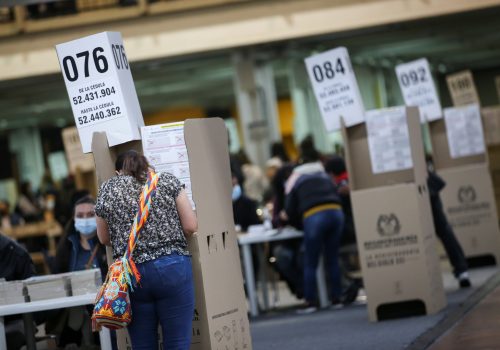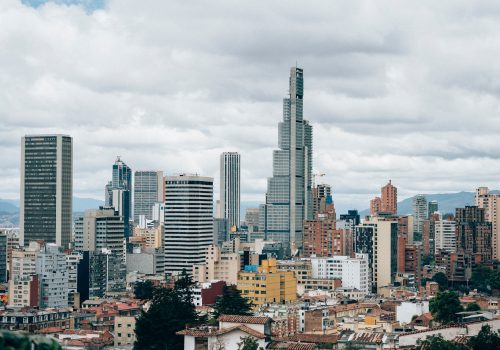Recognize the high stakes
AS WE MARK THE BICENTENNIAL of bilateral relations, we should be proud of the many successes. Our mutually beneficial alliance has been a force multiplier for hemispheric security, prosperity, and democratic governance. It is a testament to our shared democratic values and commitment to human rights. From my perspective as the lead Republican on the House Foreign Affairs Committee, the United States has no closer ally in Latin America than Colombia.
Over the last few decades, our countries confronted the scourge of narcotics trafficking and terrorism. As a result of Colombia’s political will and sustained US commitment, Colombia transformed itself into the primary pillar of Latin America’s security and stability. This success story is largely rooted in the sustained bipartisan consensus that has driven policy making from Washington and the leadership and commitment in Bogotá. It is also a testament to Colombia’s stability and prosperity as a force multiplier for US national security.
When I was first elected to Congress, conversations circled around the threats to Colombia’s existence. Violence and terrorism from the hemisphere’s longest-running conflict destabilized the region. Yet, thanks to the sacrifice of countless Colombians and staunch support from the United States, the Western Hemisphere has a strong, thriving, and prosperous democracy—and the United States has an unwavering ally. Colombia is now a hub for regional security, training, and equipping military and police personnel. Its transformation and robust democratic institutions should serve as a model for much of the region.
Progress in the security and rule of law context paved the way for the 2012 US-Colombia Trade Promotion Agreement that accelerated the economic relationship into the twenty-first century. These growing commercial ties have acted as a much-needed bulwark against China’s corrosive and growing influence in the region. Increased market access has created higher-quality investments and jobs in both the United States and Colombia. And thanks to Colombia’s growing technology sector and other entrepreneurs, it is home to Latin America’s highest fintech adoption rate. Yet, while the citizen security and financial situations have improved, the country still faces considerable challenges.
As I look at the next era of the bilateral relationship, I see our ally at a critical juncture. Colombia has not been immune from the regional wave of citizen dissatisfaction with government and democracy. The slow implementation of the 2016 peace agreement has meant that marginalized and violence-ridden areas of the country remain without a proper state presence. This is compounded by a growing regional influence of malign foreign actors promoting a departure from free markets and democratic principles. Against this backdrop, the United States must demonstrate to our allies that we are the partner of choice. This means Colombia’s priorities and needs should inform foreign policy and security objectives. For starters, we should streamline our foreign development and assistance to critical areas with the greatest potential impact. The US International Development Finance Corporation can best leverage private sector capabilities and innovative development tools to boost Colombia’s economic potential.
Often, our assistance is not competitive, arrives too late, or is poorly designed for the local context. We must rectify these shortcomings. Like many of its Pacific neighbors, Colombia is also confronting the challenge of Chinese fishing fleets conducting illegal, unreported, and unregulated (IUU) fishing. These fleets threaten environmentally sensitive zones and bully local patrol vessels and aircraft.1Fisheries and Aquaculture in Colombia, Organisation for Economic Co-operation and Development, January 2021, https://www.oecd.org/agriculture/topics/fisheries-and-aquaculture/documents/report_cn_fish_col.pdf Colombia’s affinity and commitment to the environment are incompatible with China’s poor environmental track record. While Colombia is not a signatory to China’s Belt and Road Initiative, Chinese commercial ties and investments through state-owned enterprises have grown significantly in recent years. Reversing this requires that we position ourselves as an even stronger economic partner to Colombia. Ongoing projects to nearshore parts of US supply chains closer to home provide an opportunity to do so.
Drug trafficking and organized crime remain enduring challenges for Colombia and the United States. Despite significant efforts and improvements, Colombia remains the world’s biggest producer of cocaine, with most of it ending up in the United States, where overdose rates are rising steadily. Our countries cannot afford to discontinue cocaine interdiction and coca eradication programs. As a key market for Colombian narcotics, the United States has a special responsibility to address its role in the drug trade— including the demand side of the challenge. Public health officials must take innovative steps to tackle our addiction crisis.
While we must use every proven tool to address the cocaine challenge, including exploring the possibility of aerial eradication, we cannot solely rely on eradication mechanisms. Crop substitution programs and land formalization efforts will offer legal alternatives to coca cultivation, preventing vulnerable Colombians from contributing to the narcotics trade. To ensure the sustainability of these programs, we must work to provide state presence and fill security vacuums in conflict-riddled zones.
There is no question that efforts to address the lingering narcotics issue are hampered by the Nicolás Maduro regime in Venezuela. No country suffers the brunt of the Venezuela crisis more than Colombia. Trafficking routes have proliferated along the Venezuela-Colombia border, a safe haven for terrorist groups and drug traffickers. The presence and operations of these groups from Venezuela, along with the country’s willing relationship with pariahs like Russia, China, and Cuba, has long amplified Maduro’s ability to destabilize the region.
Close to two million Venezuelan refugees and migrants have permanently resettled in Colombia and millions more throughout the hemisphere. During my last trip to Colombia, I was awestruck by the Colombian government’s generous efforts to support these vulnerable populations. While I am proud the United States remains the largest donor for displaced Venezuelans, we should continue encouraging our international partners to fully fund their pledges and increase their contributions. With the growing migrant crisis in the region, Colombia’s efforts—and those of regional partners like Costa Rica, Mexico, and Panama—to absorb displaced Venezuelans are helping to prevent migration to the United States and the spread of instability across the region.
With Venezuela’s dire security and humanitarian crisis, restoring the country’s democracy should remain a key priority for our two countries. The Maduro regime’s destructive ideology has permeated the Americas, empowering and legitimizing authoritarians and populists. As long as criminal organizations and terrorist groups remain active in Venezuela, instability will continue plaguing the Western Hemisphere. Colombia, the United States, and like-minded partners must remain resolute on this matter.
Colombia’s half-century-long conflict has left eight million Colombians displaced within its borders, including women and children. Their reintegration is an essential part of responsibly implementing the peace agreement. Women’s empowerment must also extend to the national security space. Understanding the unique value and contribution of women and promoting women’s empowerment and participation in national security must influence our engagement moving forward.
As we mark this bicentennial, we are reminded of the high stakes in Colombia and the region. Our countries must evolve the bilateral relationship to address remaining challenges and seize future opportunities. Colombia is a model and critical player in the region; it is a democratic leader, regional security trainer, and economic power. The like-mindedness and a shared sense of purpose between our countries will continue advancing the bilateral relationship for many years to come.
* * *
Representative Michael T. McCaul (R-TX) has been the Congressional representative for Texas’s 10th congressional district since 2005. McCaul is the ranking member of the House Foreign Affairs Committee and is a senior member and former chairman of the House Committee on Homeland Security. McCaul previously served as Chief of Counter Terrorism and National Security in the US Attorney’s office, Western District of Texas, and led the Joint Terrorism Task Force. McCaul also served as a Texas Deputy Attorney General.
Related Allies essays
Related program

The Adrienne Arsht Latin America Center broadens understanding of regional transformations and delivers constructive, results-oriented solutions to inform how the public and private sectors can advance hemispheric prosperity.
Image: Demonstrators take part in a protest against the tax reform of President Ivan Duque's government in Bogota, Colombia April 28, 2021. REUTERS/Luisa Gonzalez


